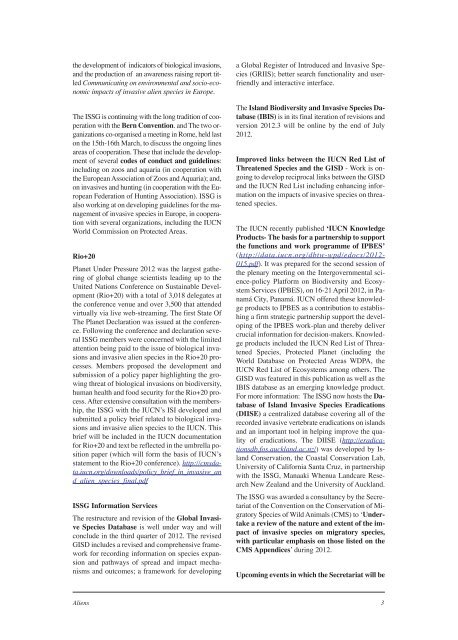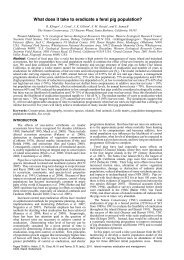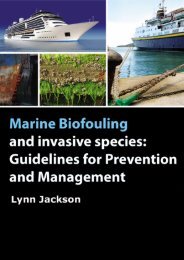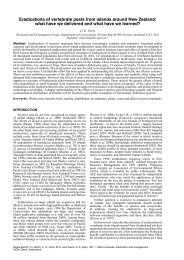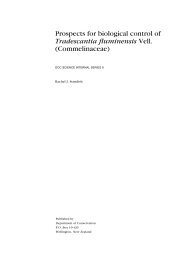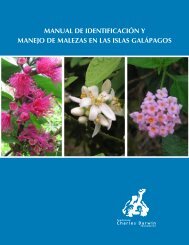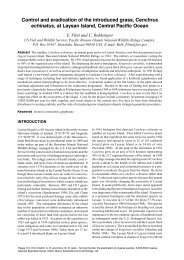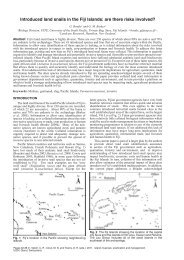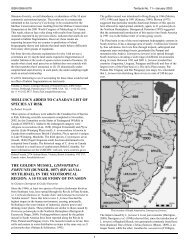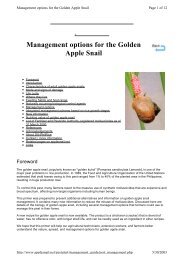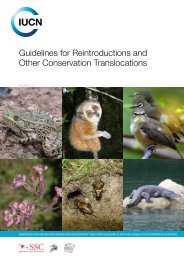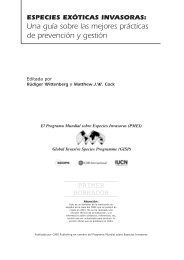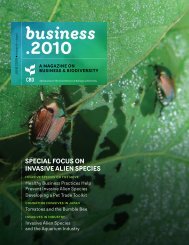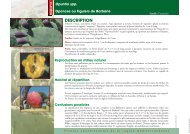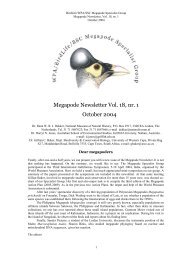Aliens - ISSG
Aliens - ISSG
Aliens - ISSG
Create successful ePaper yourself
Turn your PDF publications into a flip-book with our unique Google optimized e-Paper software.
the development of indicators of biological invasions,<br />
and the production of an awareness raising report titled<br />
Communicating on environmental and socio-economic<br />
impacts of invasive alien species in Europe.<br />
The <strong>ISSG</strong> is continuing with the long tradition of cooperation<br />
with the Bern Convention. and The two organizations<br />
co-organised a meeting in Rome, held last<br />
on the 15th-16th March, to discuss the ongoing lines<br />
areas of cooperation. These that include the development<br />
of several codes of conduct and guidelines:<br />
including on zoos and aquaria (in cooperation with<br />
the European Association of Zoos and Aquaria); and,<br />
on invasives and hunting (in cooperation with the European<br />
Federation of Hunting Association). <strong>ISSG</strong> is<br />
also working at on developing guidelines for the management<br />
of invasive species in Europe, in cooperation<br />
with several organizations, including the IUCN<br />
World Commission on Protected Areas.<br />
Rio+20<br />
Planet Under Pressure 2012 was the largest gathering<br />
of global change scientists leading up to the<br />
United Nations Conference on Sustainable Development<br />
(Rio+20) with a total of 3,018 delegates at<br />
the conference venue and over 3,500 that attended<br />
virtually via live web-streaming. The first State Of<br />
The Planet Declaration was issued at the conference.<br />
Following the conference and declaration several<br />
<strong>ISSG</strong> members were concerned with the limited<br />
attention being paid to the issue of biological invasions<br />
and invasive alien species in the Rio+20 processes.<br />
Members proposed the development and<br />
submission of a policy paper highlighting the growing<br />
threat of biological invasions on biodiversity,<br />
human health and food security for the Rio+20 process.<br />
After extensive consultation with the membership,<br />
the <strong>ISSG</strong> with the IUCN’s ISI developed and<br />
submitted a policy brief related to biological invasions<br />
and invasive alien species to the IUCN. This<br />
brief will be included in the IUCN documentation<br />
for Rio+20 and text be reflected in the umbrella position<br />
paper (which will form the basis of IUCN’s<br />
statement to the Rio+20 conference). http://cmsdata.iucn.org/downloads/policy_brief_in_invasive_an<br />
d_alien_species_final.pdf<br />
<strong>ISSG</strong> Information Services<br />
The restructure and revision of the Global Invasive<br />
Species Database is well under way and will<br />
conclude in the third quarter of 2012. The revised<br />
GISD includes a revised and comprehensive framework<br />
for recording information on species expansion<br />
and pathways of spread and impact mechanisms<br />
and outcomes; a framework for developing<br />
a Global Register of Introduced and Invasive Species<br />
(GRIIS); better search functionality and userfriendly<br />
and interactive interface.<br />
The Island Biodiversity and Invasive Species Database<br />
(IBIS) is in its final iteration of revisions and<br />
version 2012.3 will be online by the end of July<br />
2012.<br />
Improved links between the IUCN Red List of<br />
Threatened Species and the GISD - Work is ongoing<br />
to develop reciprocal links between the GISD<br />
and the IUCN Red List including enhancing information<br />
on the impacts of invasive species on threatened<br />
species.<br />
The IUCN recently published ‘IUCN Knowledge<br />
Products- The basis for a partnership to support<br />
the functions and work programme of IPBES’<br />
(http://data.iucn.org/dbtw-wpd/edocs/2012-<br />
015.pdf). It was prepared for the second session of<br />
the plenary meeting on the Intergovernmental science-policy<br />
Platform on Biodiversity and Ecosystem<br />
Services (IPBES), on 16-21 April 2012, in Panamá<br />
City, Panamá. IUCN offered these knowledge<br />
products to IPBES as a contribution to establishing<br />
a firm strategic partnership support the developing<br />
of the IPBES work-plan and thereby deliver<br />
crucial information for decision-makers. Knowledge<br />
products included the IUCN Red List of Threatened<br />
Species, Protected Planet (including the<br />
World Database on Protected Areas WDPA, the<br />
IUCN Red List of Ecosystems among others. The<br />
GISD was featured in this publication as well as the<br />
IBIS database as an emerging knowledge product.<br />
For more information: The <strong>ISSG</strong> now hosts the Database<br />
of Island Invasive Species Eradications<br />
(DIISE) a centralized database covering all of the<br />
recorded invasive vertebrate eradications on islands<br />
and an important tool in helping improve the quality<br />
of eradications. The DIISE (http://eradicationsdb.fos.auckland.ac.nz/)<br />
was developed by Island<br />
Conservation, the Coastal Conservation Lab,<br />
University of California Santa Cruz, in partnership<br />
with the <strong>ISSG</strong>, Manaaki Whenua Landcare Research<br />
New Zealand and the University of Auckland.<br />
The <strong>ISSG</strong> was awarded a consultancy by the Secretariat<br />
of the Convention on the Conservation of Migratory<br />
Species of Wild Animals (CMS) to ‘Undertake<br />
a review of the nature and extent of the impact<br />
of invasive species on migratory species,<br />
with particular emphasis on those listed on the<br />
CMS Appendices’ during 2012.<br />
Upcoming events in which the Secretariat will be<br />
<strong>Aliens</strong> 3


